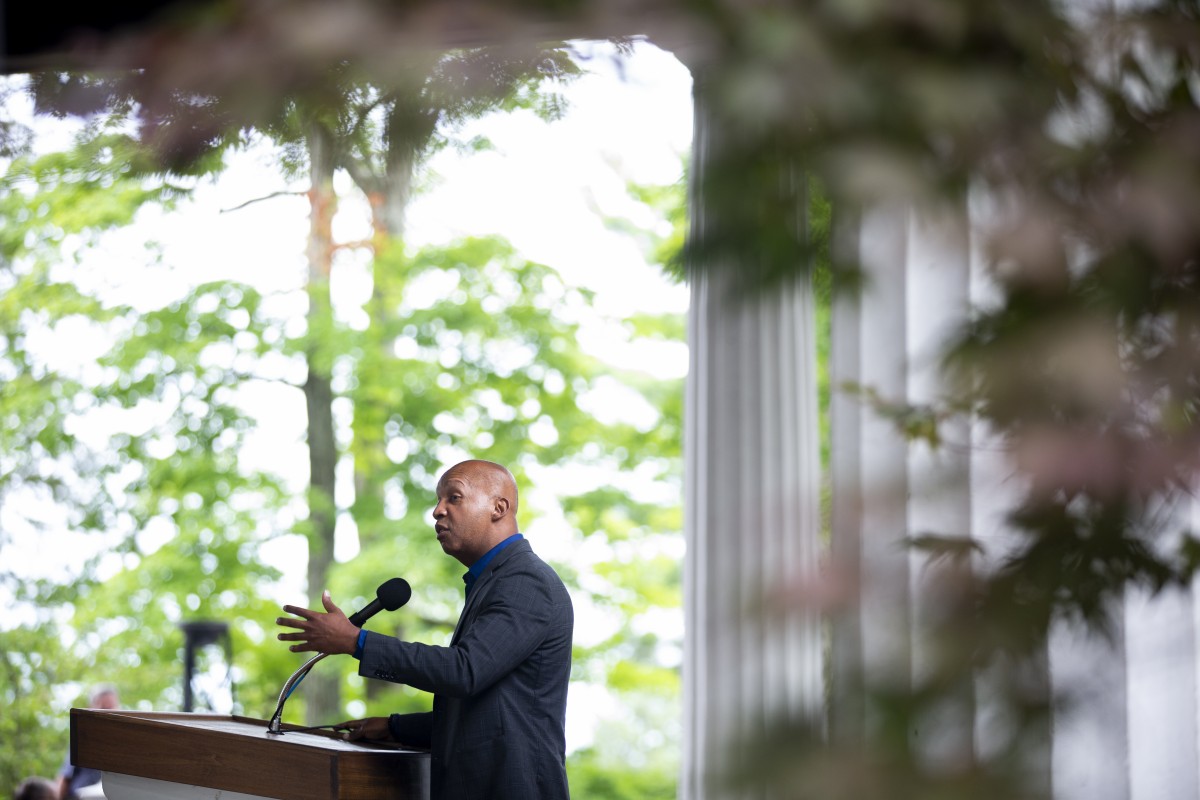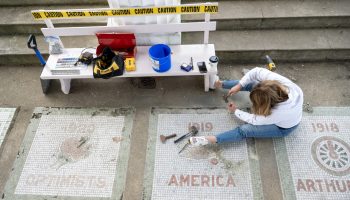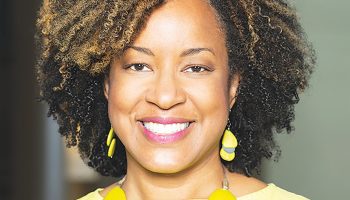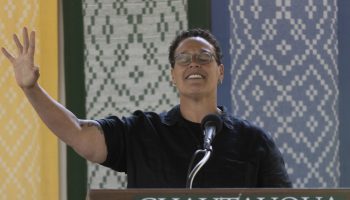As a child, Bryan Stevenson’s biggest dream was to swim in a swimming pool.
When he and his sister, Christy, recall the first time they did, they joke about how they had to ask all of the white kids to get out first. Except that is not how it happened. Bryan and Christy learned at an early age to alter the memories they can’t bear to remember.
When Stevenson was 12 years old, his mother announced she had saved enough money to send them on a bus trip to the brand new Disney World resort in Orlando, Florida. He and his sister wore their swimsuits underneath their clothes, and the minute they exited the bus to spend their first night in South Carolina, they raced to the motel pool. On the count of three, they jumped in, and chaos immediately broke out around them. Parents were screaming at the other children to get out of the pool, some even grabbing them before they had the chance to respond. When there was one little boy left in the pool, a white man came over and pulled him out. That is when Stevenson asked him a question.
“The question that I asked him was ‘What’s wrong?’ ” Stevenson said. “What he said to me, I remember like it happened yesterday. He looked at me and he said, ‘You’re wrong, n*****.’ ”
At 2 p.m. Mon., Aug. 13, in the Hall of Philosophy, Stevenson, founder and executive director of the Equal Justice Initiative, a nonprofit organization that represents prisoners who may have been wrongly convicted, poor prisoners without effective representation, and others who may have been denied a fair trial, gave his lecture, “Honoring Dr. King’s Legacy: What Should We Have Learned in the Past, but Have Not Yet, to Our Peril?” as part of Week Eight’s interfaith theme, “Not to be Forgotten: A Rememberance on Dr. Martin Luther King Jr.”
Now, Stevenson, who is also the author of Just Mercy, has started to think about that day in the swimming pool differently. He wonders if the children remember getting out of the pool because two black kids jumped in. He wonders if that man remembers what he said to him or why he felt the need to say it.
“I worry they haven’t talked about it,” he said. “I worry that they are not haunted by what was done, and I even worry that they do not have a consciousness of wrongdoing or shame or mistake.”
Stevenson said he worries about the lack of consciousness because without memories, human beings repeat mistakes again and again.
“Because we don’t remember, I think we are living in this time of crisis,” he said.
There are four things Stevenson said Martin Luther King Jr. would want people to remember.
The first is that Americans can’t have justice if they are unwilling to get into close proximity to the people who are suffering.
“(Dr. King) could not march without going to Selma, he could not be an advocate unless he was willing to go to Albany, he could not make a difference in the lives and spaces of this country without going to Birmingham,” Stevenson said. “It was key to his philosophy and to his vision that justice requires proximity.”
Stevenson learned about proximity from his grandmother. When he was a little boy, his grandmother started giving him hugs and would squeeze him so tightly it would start to hurt.
“An hour later, she would see me and she would say, ‘Bryan, do you still feel me hugging you?’ ” Stevenson said. “If I said no, she would jump on me again.”
Stevenson’s grandmother developed cancer in her 90s, and Stevenson, who was a college student at the time, went to visit her before she passed. Her eyes were closed, and he was not sure she could hear him until the moment he got up to leave.
“My grandmother opened her eyes and she squeezed my hand, and the last thing she said to me was ‘Bryan, can you still feel me hugging you? I am always going to be hugging you,’ ” he said.
Stevenson said that day with his grandmother taught him the importance of presence within proximity.
“There is something that happens when we get closer to people who are suffering and struggling,” Stevenson said. “When we get close to people who have been abused and neglected and who have been marginalized, at minimum we can wrap our arms around them, and our presence means that something can be transformed.”
Stevenson said he experienced the power of proximity firsthand when lawyers came into his home community and fought for all of the black children’s rights to receive an education. That work led Stevenson to become the first in his family to go to college.
Stevenson loved college so much that he wanted to stay for as long as possible. He went through undergrad as a philosophy major and realized he could only do graduate work in history, English or political science. Stevenson chose Harvard Law School and said he found himself “deeply disillusioned.”
“I went there because I was concerned about inequality and racism and poverty, and it didn’t seem like anybody was talking about those issues,” he said.
After finishing one year of law school, Stevenson switched to the school of government to get a degree in public policy, only to find he was more miserable there than he was before.
“They were teaching us to maximize benefits and minimize cost, but it didn’t seem to matter whose benefits got maximized and whose costs got minimized,” Stevenson said.
Therefore, Stevenson returned to law school and aimed to become proximate with the work that really mattered to him.
He took a course that required him to spend a month with a human rights organization. Stevenson ended up in Atlanta, Georgia, working with a group of lawyers who represented people on death row. After one week on the job, a lawyer asked Stevenson to go to death row and let an inmate know he was not at risk of being executed in the next year.
The next day, Stevenson left to meet the inmate. He said he was most nervous about the man being disappointed that he was only a law student.
“I was pacing back and forth, trying to rehearse exactly what I was going to say to this man,” he said.
When the guards finally opened the door, there stood the first condemned prisoner Stevenson had ever seen. When the prisoner walked over to him, Stevenson told him about his execution date, and the prisoner grabbed his hands and asked him to repeat it two more times.
“That is when this man said, ‘Thank you, thank you, thank you,’ ” Stevenson said. “He said, ‘You are the first person I have met in the two years I have been on death row who is not a death row prisoner or a death row guard.’ ”
After that initial conversation, Stevenson and the inmate got wrapped up in conversation about each other’s lives for three hours. After that, the guards burst into the room, and Stevenson noticed they were mad.
“They threw his arms back and started putting the chains on his wrists so violently I could see the metal pinching his skin,” Stevenson said. “I begged them to be gentler, and this man looked at me and said, ‘Bryan, don’t worry about this. You just come back.’ ”
The guards shoved the man toward the exit, and when he reached the door, he planted his feet.
“I stood there and I watched this man close his eyes, throw his head back, and then he started to sing,” Stevenson said. “He started singing this hymn: ‘I’m pressing on the upward way, new heights I’m gaining every day; Still praying as I’m onward bound, Lord, plant my feet on higher ground.’ ”
Stevenson said having the proximity to hear that man sing is what changed his life forever and decided his career path.
The second thing Stevenson said King would want people to remember is the power one has to change narratives.
“We can’t just engage in policy debates and issue debates,” he said. “We have to understand the narratives underneath the policies and the issues.”
Stevenson believes mass incarceration exists in America because of a “false narrative.”
“We say that people with drug dependencies are criminals, and so we put them in jails and prisons,” Stevenson said. “We did not have to do that. We could have said that people with drug addiction and drug dependency have a health problem, and we need our health care system to respond to this problem.”
According to Stevenson, people made the choice to imprison those with addiction and dependency because of what he calls “politics of fear and anger.”
“We were being governed by people who were preaching to us to be afraid and to be angry, and I believe if we allow ourselves to be governed (that way), we will tolerate things we are not supposed to tolerate,” he said.
King taught that fear and anger are the essential “ingredients of injustice,” Stevenson said.
“Go into the world where there is oppression, and if you ask the oppressors why they do what they do, they can give you a narrative they believe justifies the abuse of other people,” Stevenson said.
Stevenson said the narrative regarding race needs to change more than any other.
“I don’t think we are free,” he said. “I don’t. I think we are burdened by a history of racial inequality that has created a kind of smog in the air, and it doesn’t matter where you are — California, New York, Alabama or Mississippi — we are all burdened, we are all unhealthy as a result of history that we haven’t talked about.”
Stevenson said what needs to be talked about is that Americans live in a “post-genocide society,” the genocide being the massacre of Native American people.
“We kept their word, ‘Chautauqua,’ but we made the people leave,” he said. “And we do not have any echo of that suffering in our minds or in our hearts.”
That massacre created a narrative of racial difference, one that Stevenson said led to Americans being comfortable with two centuries of enslavement.
“It was this ideology of white supremacy that we made up to justify enslavement,” Stevenson said. “It was that black people are different than white people — they can’t do this, they can’t do that, they aren’t full human. They are three-fifths human, the Supreme Court said. That narrative was the true evil of slavery.”
The 13th Amendment talks about the abolishment of involuntary servitude and forced labor, but because it does not say anything about ending the narrative of racial differences, Stevenson believes slavery did not end, it only evolved.
“(Black people) were murdered and beaten and drowned and hanged, and it was something that we turned our eyes away from,” he said. “We were tolerant. We allowed fear and anger to make us do nothing, and millions of people were terrorized.”
The third thing Stevenson said King would want people to remember is to stay hopeful, because hope is a “super power.”
“It is critical that we hope, because hope will get us to stand up when other people say, ‘Sit down,’ ” Stevenson said. “It will get us to speak when other people say, ‘Be quiet.’ There is something powerful about it, and the truth is you’re either hopeful or you are the problem.”
Stevenson said living in Alabama makes it hard for him to remain hopeful. In Alabama, Confederate Memorial Day and the birthday of Jefferson Davis, the president of the Confederate States, are state holidays. In addition, Alabama does not celebrate Martin Luther King Jr. Day. It celebrates MLK-Lee Day.
But it is not just the South that causes Stevenson to struggle with hope.
Stevenson was representing a client in the Midwest, and when he sat down in the courtroom, the judge got angry and told him to sit in the hallway until his lawyer got there. Stevenson got up and introduced himself as the lawyer, and both the judge and the prosecutor laughed.
“I got to thinking what it was about this judge that when he saw a middle-aged black man in a suit and tie, sitting at the table, it didn’t even occur to him that that’s the lawyer?” Stevenson said.
A couple years ago, he talked about the incident in a TV interview. A few weeks ago, Stevenson’s secretary approached him and said there was a man who wanted to talk to him. The secretary tried to explain that Stevenson was busy, but the man began to cry.
“I went down into our lobby, and it was an old white man and he just grabbed me and started sobbing,” Stevenson said. “I didn’t recognize him, but through his sobs he said, ‘I heard you talking on TV. I am the judge that told you to go back out in that hallway. I am so sorry.’ ”
Although Stevenson told him he did not need to apologize, the judge persisted.
“There is something powerful that happens when we have the courage to confront the things that need to be confronted, but our hope is key to our ability to do that,” Stevenson said.
The fourth and final thing Stevenson said King would want people to remember is that one must be willing to do things that are inconvenient and make the individual uncomfortable.
“We can’t create justice if we insist on only doing the things that are comfortable and convenient,” he said. “It just doesn’t work that way.”
A few years ago, Stevenson got a call from a man who was scheduled to be executed in 30 days. The man said his lawyers had abandoned his case and he needed someone to take it. Stevenson discovered the man suffered from intellectual disabilities, meaning he could not legally be executed.
Stevenson went to the trial court, the state court, the appeals court and the federal court, and all told him it was too late.
The day of the execution, Stevenson was still waiting for a decision from the United States Supreme Court. An hour before the man’s scheduled time, the phone rang. The clerk told him the motion was denied.
Stevenson said this situation embodied the most difficult part of his job.
As Stevenson told the man he could not stop the execution, the man began to sob. But he told Stevenson to stay on the phone because there was something he needed to say. However, he could barely get it out because an aspect of his disability was severe stuttering under stress.
“At one point, I was just standing there holding the phone, and tears were running down my face,” Stevenson said. “It was so uncomfortable, so painful, my mind actually wandered.”
Stevenson’s mind wandered to a little boy he knew in church when he was a child. This little boy also had a stutter, and Stevenson’s mother witnessed as he started to laugh at the boy. Stevenson’s mother made him apologize, give the little boy a hug and tell him he loved him.
As Stevenson returned to the present moment, he heard what the man on the phone had to say.
“He said, ‘Mr. Stevenson, I want to thank you for representing me. I want to thank you for fighting for me,’ ” Stevenson said. “And the last thing that man said to me was ‘Mr. Stevenson, I love you for trying to save my life.’ ”
After the man was executed, Stevenson thought he could not continue his work.
“It was too hard and it was too painful,” he said. “I was thinking about how lonely he was, and the question I had in my mind was ‘Why do we want to kill all of the broken people? What is it about us that when we see brokenness, we want to crush it and hurt it and kill it?’ ”
Not only did Stevenson realize he represents broken people, he also realized he works in a broken system. But his greatest revelation that day was discovering why it is he started to do this work in the first place.
“I realized I don’t do what I do because I have been trained as a lawyer,” Stevenson said. “I do not do what I do because someone has to do it. I don’t do what I do because it is important. I realized I do what I do because I am broken, too.”
However, even though some people are broken, Stevenson does not believe it makes them any less capable of changing the world.
“It is the broken among us that can teach us the way mercy can heal,” he said. “It is the broken that understand the power of compassion. It is the broken that can teach us why justice is urgent in a society like ours and (it is) in brokenness that we understand what our humanity is all about.”
In the end, Stevenson said in order to achieve King’s ideal peace in society, people must learn to look beyond the surface of those around them.
“I believe each of us is more than the worst thing we have ever done,” he said. “I think if someone tells a lie, they are not just a liar. I think if someone takes something, they are not just a thief. I think even if someone kills someone, they are not just a killer. Justice requires that we know the other things you are.”





